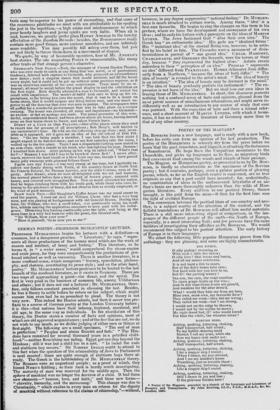GERMAN POETRY—PROFESSOR MUHLENFELS' LECTURES.
PROFESSOR MUHLENFELS begins his lectures with a definition—a common, but a dangerous practice. " Literature,- he says, "repre- sents all those productions of the human mind which.are the work of reason and intellect, of fancy and feeling." This literature, as he terms it, in " a wider sense," would comprehend the steam-engine and mule jenny, for they were unquestionably the productions of pro- found intellect as well as reasoning. There is another literature, in a more confined sense, which comprises " history, speculative, philoso- phy, and rhetoric, constituting its prose style ; and on the other hand, poetry." Mr. MUHLENFELS' -lecture professes to be limited to the last branch of this confined literature, as it exists in Germany. There are two ways of approaching a point—the direct, and the spiral. The first is very good in the business of common life, among Utilitarians and others ; but it does not suit a lecturer ; Dr. MUHLENFELS, there- fore, only follows constant precedent in choosing the last. Besides, he has a theory to settle before he enters on his subject, which might excuse him even had he no precedent to plead. The theory is not very new. This indeed the Doctor admits, but then it never was pre- lim to a course of German poetry at the London University before ; it is this—that nations have their infancy, boyhood, manhood, and old age, in the same way as individuals. In his elucidation of this theory, the Doctor states a number of facts and opinions, most of which are old approved acquaintances ; and of the few that are not, we do not wish to say much, as we dislike judging of either men or things at firstsight. The following are a small specimen. "The end of man is peklection." "Peoples and states flourish and fade." "The Hin- doos have remained for several thousand years in a petrified child- hood,"—neither flourishing nor fading. Egypt got one step beyond the Hindoos ; still it was but a child too in a sort. "In Israel the rude and stubborn boy occurs." Sir ROBERT INGLIS ought to attend to this fact when the question of the admissibility of Jews to Parliament is next mooted : there are quite enough of stubborn boys there al- ready. The Greek is the hobbledehoy of Dr. MUHLENFELS. theory. The Romans were an unpoetical people; as a proof of which, they hissed Dizito's fiddling; so their rank is hardly. worth investigating. The maturity of man was reserved for the middle ages. Then the sphere of mankind was no longer the horizon of a child. It had three new elements—" honour, love, and faith ;" and three new forms- " chivalry, hierarchy, and the minnesong." This change was due to Christianity," which excites in every man an esteem for the dignity of. mankind without reference to the claims of citizenship,"—without, however, in any degree suppressing" national feeling." Dr. MusLEN- FELS is much attached to certain words. Among these, "idea" is a first-rate favourite. He begins to ring the changes on this term in his preface, where we have the development mid conveyance of his own ideas ; and he ends his lecture with a panegyric on the ideas of MARTIN. LUTHER. The Jews fashioned God " after their own idea." The Greek has" an enthusiastic idea." • His gods are "idealized forms." His "indistinct idea" of the eternal Being was, however, to be satis- fied by his belief in fate. The Crusades were a monument of disin- terestedness in pursuit of " one grand idea." CESAR, MAHOMET, CHARLEMAGNE, and GREGORY the Seventh, were the heroes of their day, because " they represented the highest ideas." Artists create according to their " perception of an idea." PHIDIAS " represents an idea" different from PRAXITELES. HOMER delineates Jove differ- ently from a Northern, " because the ideas of both differ." " The idea of beauty" is revealed to the artist's mind. "The idea of beauty is an intuition." "The idea of beauty may be dormant in the mind." " The idea of beauty gradually perfects the instrument." "The ex- pression is not born of the idea." But we shall lose our own ideas in tracing those of Dr. MUHLENFELS. In short, this discourse presents nothing but a confused array of facts and opinions, gleaned from the most patent sources of miscellaneous information, and might serve in- differently well as an introduction to any course of study that ever was pursued. With the exception of here and there a formal refer- ence, and a short account of MARTIN LUTHER, with which it termi- nates, it has no relation to the literature of Germany more than to that of any other country.


















 Previous page
Previous page